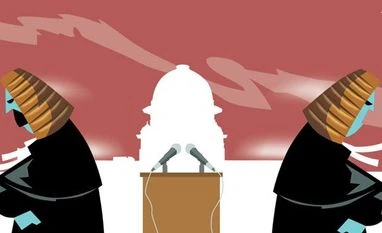All 25 Supreme Court judges are expected to meet soon to resolve the crisis in the country's apex court after four senior-most judges complained against Chief Justice Dipak Misra over allocation of cases.
Informed sources told IANS that a Full Court meeting of the Supreme Court judges will take place at the earliest to take a call on the issue and deliberate over the complaints highlighted in public by the four judges -- Justices J. Chelameswar, Ranjan Gogoi, Madan B. Lokur and Kurian Joseph -- who are the senior-most after Justice Misra in that order.
The rebel judges criticised the Chief Justice over allocation of cases, saying the administration of the top court was "not in order".
As there was no solution in sight, Supreme Court Bar Association President Vikas Singh met Justice Misra and gave him a copy of the resolution the Bar passed on Saturday. The resolution also suggested a Full Court meeting to resolve the matter.
Two days after the crisis began, a seven-member delegation of the Bar Council of India (BCI) on Sunday also met the Chief Justice to convey its concern over the issue. The BCI also met three of the four rebel judges.
"We hope that the issue will be sorted out amicably and no one from outside should interfere," BCI President Manan Kumar Mishra told reporters.
"During the meetings with Justice Misra, Justice Chelameswar, Justice Lokur, Justice Joseph and other judges, each one of them assured us that the issues will be resolved. The meetings with the judges took place in a very cordial atmosphere."
Also Read
Justices Sharad Arvind Bobde and L. Nageswara Rao also met Justice Chelameswar at his residence.
As the crisis lingered, four retired judges wrote to Justice Misra on Sunday, throwing their weight behind the four rebel judges who "have brought to light a serious issue regarding the manner of allocation of cases, particularly sensitive cases, to various benches of the Supreme Court".
The retired judges are Justice P.B. Sawant, a former Supreme Court judge, Justice A.P. Shah, former Chief Justice of the Delhi High Court, Justice K. Chandru, a former judge of the Madras High Court, and Justice H. Suresh, a former judge of the Bombay High Court.
They appreciated the "grave concern" raised by the four Supreme Court judges that cases were not being allocated in a proper manner and "arbitrarily" allocated to "particular designated benches, often headed by junior judges".
"This is having a very deleterious effect on the administration of justice and the rule of law," read the letter by the four former judges.
They said they agreed with the view of the rebel judges that the Chief Justice despite being the master of roster cannot assign cases "in an arbitrary manner such that, sensitive and important cases are sent to hand-picked benches of junior judges by the Chief Justice".
"This issue needs to be resolved... for allocation of benches and distribution of cases, which are rational, fair and transparent. Only such measures would assure the people that the Supreme Court is functioning in a fair and transparent manner and that the power of the Chief Justice as master of roster is not being misused to achieve a particular result in important and sensitive cases. We, therefore, urge you to take immediate steps in this regard."
Meanwhile, the Co-ordination Committee of All District Bar Associations of Delhi on Sunday condemned the four senior Supreme Court judges for going public over their differences with Justice Misra.
)